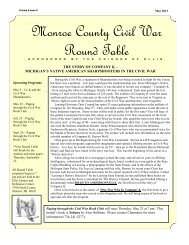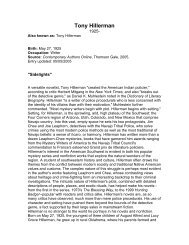Biography Resource Center Stephen Dobyns "Sidelights"
Biography Resource Center Stephen Dobyns "Sidelights"
Biography Resource Center Stephen Dobyns "Sidelights"
Create successful ePaper yourself
Turn your PDF publications into a flip-book with our unique Google optimized e-Paper software.
genre. Washington Post Book World columnist Jean M. White cited <strong>Dobyns</strong>'s fiction for its "slyly<br />
quiet humor and tender feeling." In a Washington Post Book World review of Dancer with One<br />
Leg, Lawrence Block wrote of <strong>Dobyns</strong>: "His writing is honest, toughminded, and as<br />
uncompromising as his unforgettable hero. There's not a false sentence anywhere, not a moment<br />
where interest flags." Comparing <strong>Dobyns</strong> to Vladimir Nabokov in a Washington Post review of<br />
Cold Dog Soup, Carol E. Rinzler concluded: "[<strong>Dobyns</strong>] possesses a sensibility that is worth<br />
capturing in the amber of fiction, thoughtful but not devoid of sentiment, intelligent but not sterile."<br />
<strong>Dobyns</strong> is best known for his "Saratoga" series, a group of crime novels set in Saratoga Springs,<br />
New York, featuring a self-doubting detective named Charlie Bradshaw and his hedonistic<br />
sidekick, Victor Plotz. Many of the plots center around corruption in the horse racing industry, as<br />
Saratoga is a prominent stop on the thoroughbred racing schedule. <strong>Dobyns</strong> was among a group<br />
of detective writers who began to see their protagonists as mortals rather than stereotypes--<br />
Charlie Bradshaw has undergone a divorce, a great deal of self-recrimination, and a turbulent<br />
descent into middle age. In an interview with Booklist, <strong>Dobyns</strong> explained: "I don't like mystery<br />
heroes who are too perfect--characters who never have problems, or if they do, conquer them<br />
easily, and who have great secondary knowledge of subjects like wine or German shepherds. I<br />
wanted to write about a character who caught colds, who had problems with his car, whose<br />
marriage was falling apart--someone, in other words, who seemed far more realistic to me." Of<br />
Victor Plotz, who narrates several of the novels himself, <strong>Dobyns</strong> noted: "I'm sure he resembles<br />
many of my own darker qualities. . . . Working from his point of view is fun. Victor's jokes are a<br />
pleasure to write."<br />
New York Times Book Review correspondent Ann Arensberg declared: "<strong>Stephen</strong> <strong>Dobyns</strong>'s<br />
mystery novels have two major assets that accumulate high rates of interest from book to book:<br />
his setting, Saratoga Springs, and his private detective, Charlie Bradshaw. . . . Unlike most<br />
fictional detectives, who give the same flawless performance over and over again in a world<br />
outside time, Charlie is allowed by his creator to suffer changes and even to age. He is mortal,<br />
like us, and his struggles and successes matter."<br />
<strong>Dobyns</strong> is equally acclaimed for his darker psychological thrillers. In After Shocks, Near Escapes,<br />
he describes in harrowing detail the lasting effects of a devastating earthquake on one young<br />
Chilean girl and her extended family. The novel's narrator, Lucy Recabarren, looks back from a<br />
troubled adulthood to the events surrounding the earthquake, which forever altered her naïve<br />
certainties about existence. "Populating a historical catastrophe with fictional characters,<br />
[<strong>Dobyns</strong>] examines not so much the earthquakes in their past as the futures they project for<br />
themselves after the great disaster," Ron Loewinsohn observed in the New York Times Book<br />
Review. The critic added: "<strong>Stephen</strong> <strong>Dobyns</strong> is a writer with an impressive range. . . . He is mostly<br />
interested in the quake as a very provocative organizing metaphor: the ground we stand on, the<br />
present moment, is always unstable, always shaky."<br />
The author explores this theme further in his well-received The Church of the Dead Girls. A series<br />
of grisly murders in a small town provokes a level of paranoia and vigilante justice that might have<br />
seemed inconceivable to the heretofore complacent and "civilized" townspeople. "This chiller is<br />
about the awful power of fear," maintained a Publishers Weekly reviewer. "When the people of<br />
Aurelius go looking for a monster, monsters are all they can see." Booklist contributor Joanne<br />
Wilkinson praised the book as a "dark, cerebral thriller" in which <strong>Dobyns</strong> is "not as interested in<br />
the pathology of the serial killer . . . as he is in the pathology that exists within us all."<br />
The pathology of community is again dissected in Boy in the Water, a thriller set at a private<br />
academy in New Hampshire. Seeking release from the guilt he feels over the death of his wife<br />
and daughter in a house fire, Jim Hawthorne takes a job as headmaster at Bishop's Hill<br />
Academy, a school known for its wealthy but troubled student population. Despite his best efforts,<br />
Hawthorne finds that the staff and many of the students are conspiring against him--with deadly<br />
results. In his Booklist review of Boy in the Water, Bill Ott wrote: "This one adds elements of














